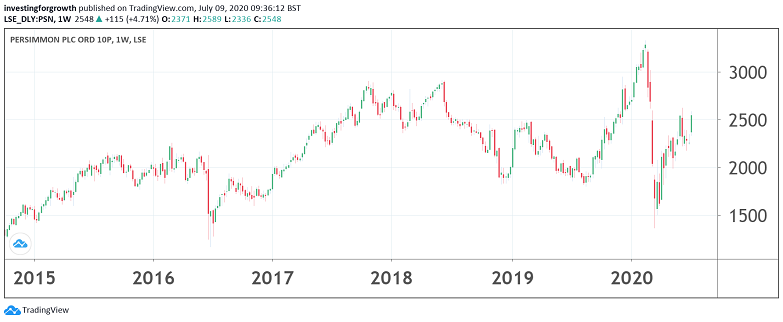Here’s why Persimmon shares are near a post-crash high
The UK housebuilder just issued a half-year update. Our head of markets explains what the numbers mean.
9th July 2020 09:56
by Richard Hunter from interactive investor
The UK housebuilder just issued a half-year update. Our head of markets explains what the numbers mean.

Persimmon (LSE:PSN) has underlined its credentials as a favoured play within the housebuilding sector, as its financial strength and prudent management continue to reap rewards, despite the challenging economic tides washing over the business.
Of course, it has not been plain sailing. The enforced lockdown following the pandemic vastly reduced operations, although for a relatively short period of time, with new completions falling by 35% in the first six months of 2020. Total revenues declined 32% and the company therefore took an as yet unquantified hit on operating margins.
The coronavirus arrived at a time when Persimmon was grappling with issues of build quality and customer service, which threatened to tarnish the brand. With these issues largely of its own making, the company found itself having to devote time to amend some of its practices to avoid a rough reputational ride.

Source: TradingView. Past performance is not a guide to future performance.
From a broader perspective, the real unknown remains the strength, or otherwise, of a UK economy currently in the midst of recession, with the uncertainty of the renewed Brexit negotiations also in the mix.
The propensity of the consumer to move or buy a new house, in what could well prove to be a laboured economic recovery, is an obvious potential drag on prospects.
Furthermore, recent pressure on house prices generally is negative news for the company, and house enquiries for the sector as a whole saw a decline of 7% in April and 94% in May, although June saw a return to positive territory. The potential withdrawal of the Help to Buy scheme also threatens to punch a hole in future revenues.
Despite these headwinds, Persimmon has, for the most part, risen to the challenges in some style. Even during the depths of the lockdown, the company was able to continue with sales using its online facility, including virtual viewings and the break provided the opportunity for some forward planning to be put in place. As such, the company retained all staff on full pay without resorting to any of the available government schemes.
- Chancellor Rishi Sunak pledges extra £30bn to save the UK economy
- Government cuts stamp duty on properties up to £500,000
- Summer Statement: Sunak’s ‘eat out to help out’ scheme to kickstart hospitality
- Take control of your retirement planning with our award-winning, low-cost Self-Invested Personal Pension (SIPP)
Since the tentative return to some kind of normality, the signs are positive. The company’s build programmes are fully restored, net reservations over the last six weeks have risen 30% year-on-year, while forward sales are also ahead by some 15%. Net cash remains at an extremely healthy level of £830 million, average selling prices increase over the period by 3.7% and this is all underpinned by the quality and high margin nature of the company’s landbank.
In terms of the latter, Persimmon is becoming increasingly selective with a potentially difficult period ahead, and spend on new land acquisitions of £165 million compares with a previous figure of £239 million.
Persimmon has also noted that 50% of its completions in the first half were to first-time buyers. The announcement of a stamp duty holiday on properties up to £500 000 in Chancellor Rishi Sunak’s “mini-Budget,” could therefore provide an additional fillip to prospects against a backdrop of generally good mortgage availability, a general housing shortage and historically low interest rates.
The shares have unsurprisingly had a volatile ride of late, having dropped 11% in the last six months, but have risen by 57% since the indiscriminate sell-off across the board in March.
Perhaps more telling is the performance over the last year, where Persimmon shares have significantly outperformed, with a 29% increase in the price comparing to a decline of 18% for the wider FTSE 100 index. The company is therefore well placed to respond to the inevitable and impending economic challenges, with the market consensus of the shares remaining resolute at a ‘strong buy’.
These articles are provided for information purposes only. Occasionally, an opinion about whether to buy or sell a specific investment may be provided by third parties. The content is not intended to be a personal recommendation to buy or sell any financial instrument or product, or to adopt any investment strategy as it is not provided based on an assessment of your investing knowledge and experience, your financial situation or your investment objectives. The value of your investments, and the income derived from them, may go down as well as up. You may not get back all the money that you invest. The investments referred to in this article may not be suitable for all investors, and if in doubt, an investor should seek advice from a qualified investment adviser.
Full performance can be found on the company or index summary page on the interactive investor website. Simply click on the company's or index name highlighted in the article.